
Local-File-Organizer
An AI-powered file management tool that ensures privacy by organizing local texts, images, and PDFs. Using Google Gemma 2-2B and Llava v1.6 models with the Nexa SDK, it intuitively scans, restructures, and organizes files for quick, seamless access and easy retrieval.
Stars: 1019
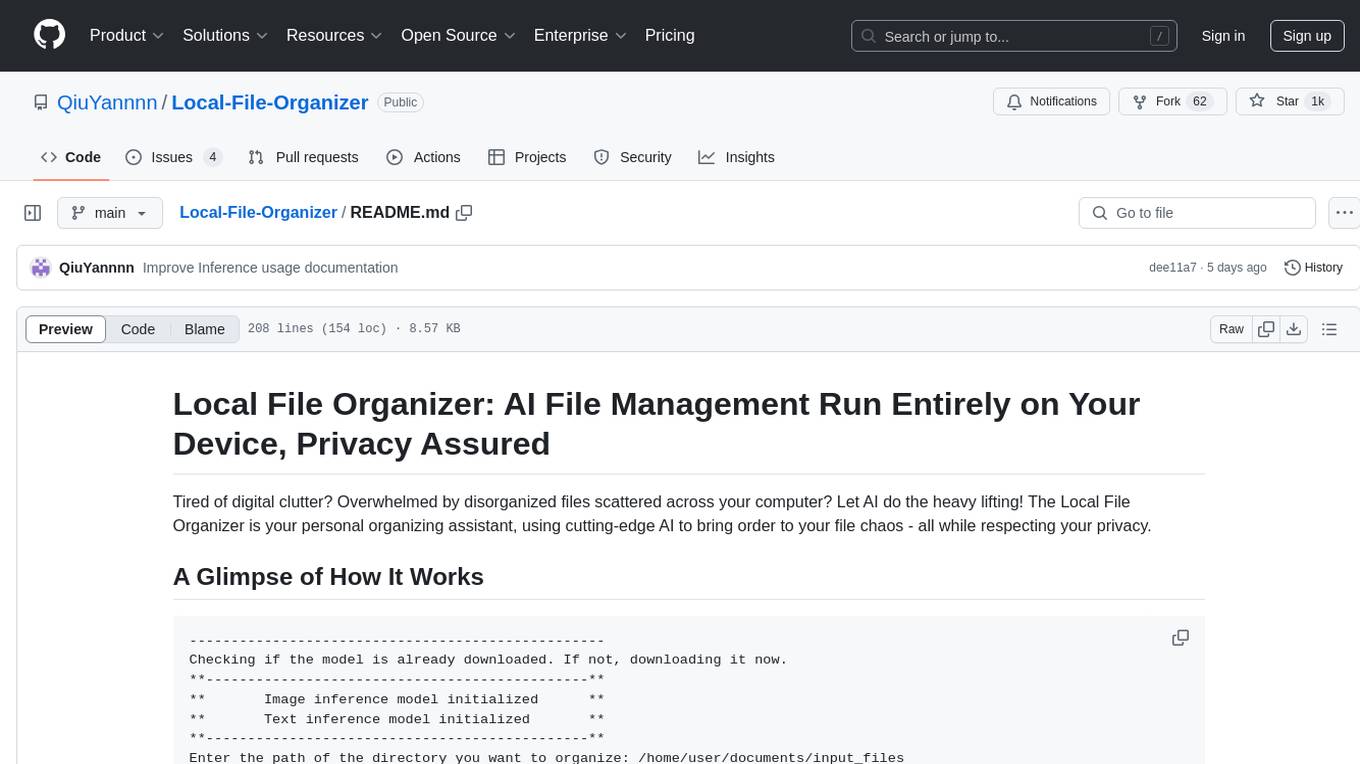
The Local File Organizer is an AI-powered tool designed to help users organize their digital files efficiently and securely on their local device. By leveraging advanced AI models for text and visual content analysis, the tool automatically scans and categorizes files, generates relevant descriptions and filenames, and organizes them into a new directory structure. All AI processing occurs locally using the Nexa SDK, ensuring privacy and security. With support for multiple file types and customizable prompts, this tool aims to simplify file management and bring order to users' digital lives.
README:
Tired of digital clutter? Overwhelmed by disorganized files scattered across your computer? Let AI do the heavy lifting! The Local File Organizer is your personal organizing assistant, using cutting-edge AI to bring order to your file chaos - all while respecting your privacy.
--------------------------------------------------
Checking if the model is already downloaded. If not, downloading it now.
**----------------------------------------------**
** Image inference model initialized **
** Text inference model initialized **
**----------------------------------------------**
Enter the path of the directory you want to organize: /home/user/documents/input_files
--------------------------------------------------
Enter the path to store organized files and folders (press Enter to use 'organized_folder' in the input directory)
Output path successfully upload: /home/user/documents/organzied_folder
--------------------------------------------------
Time taken to load file paths: 0.00 seconds
--------------------------------------------------
Directory tree before renaming:
Path/to/your/input/files/or/folder
├── image.jpg
├── document.pdf
├── notes.txt
└── sub_directory
└── picture.png
1 directory, 4 files
*****************
The files have been uploaded successfully. Processing will take a few minutes.
*****************
File: Path/to/your/input/files/or/folder/image1.jpg
Description: [Generated description]
Folder name: [Generated folder name]
Generated filename: [Generated filename]
--------------------------------------------------
File: Path/to/your/input/files/or/folder/document.pdf
Description: [Generated description]
Folder name: [Generated folder name]
Generated filename: [Generated filename]
--------------------------------------------------
... [Additional files processed]
Directory tree after copying and renaming:
Path/to/your/output/files/or/folder
├── category1
│ └── generated_filename.jpg
├── category2
│ └── generated_filename.pdf
└── category3
└── generated_filename.png
3 directories, 3 files
This intelligent file organizer harnesses the power of advanced AI models, including language models (LMs) and vision-language models (VLMs), to automate the process of organizing files by:
-
Scanning a specified input directory for files.
-
Content Understanding:
- Textual Analysis: Uses the Gemma-2-2B language model (LM) to analyze and summarize text-based content, generating relevant descriptions and filenames.
- Visual Content Analysis: Uses the LLaVA-v1.6 vision-language model (VLM), based on Vicuna-7B, to interpret visual files such as images, providing context-aware categorization and descriptions.
-
Understanding the content of your files (text, images, and more) to generate relevant descriptions, folder names, and filenames.
-
Organizing the files into a new directory structure based on the generated metadata.
The best part? All AI processing happens 100% on your local device using the Nexa SDK. No internet connection required, no data leaves your computer, and no AI API is needed - keeping your files completely private and secure.
We hope this tool can help bring some order to your digital life, making file management a little easier and more efficient.
- Automated File Organization: Automatically sorts files into folders based on AI-generated categories.
- Intelligent Metadata Generation: Creates descriptions and filenames using advanced AI models.
- Support for Multiple File Types: Handles images, text files, and PDFs.
- Parallel Processing: Utilizes multiprocessing to speed up file processing.
- Customizable Prompts: Prompts used for AI model interactions can be customized.
-
Images:
.png,.jpg,.jpeg,.gif,.bmp -
Text Files:
.txt,.docx -
PDFs:
.pdf
- Operating System: Compatible with Windows, macOS, and Linux.
- Python Version: Python 3.12
- Conda: Anaconda or Miniconda installed.
- Git: For cloning the repository (or you can download the code as a ZIP file).
Clone this repository to your local machine using Git:
git clone https://github.com/QiuYannnn/Local-File-Organizer.gitOr download the repository as a ZIP file and extract it to your desired location.
Create a new Conda environment named local_file_organizer with Python 3.12:
conda create --name local_file_organizer python=3.12Activate the environment:
conda activate local_file_organizerTo install the CPU version of Nexa SDK, run:
pip install nexaai --prefer-binary --index-url https://nexaai.github.io/nexa-sdk/whl/cpu --extra-index-url https://pypi.org/simple --no-cache-dirFor the GPU version supporting Metal (macOS), run:
CMAKE_ARGS="-DGGML_METAL=ON -DSD_METAL=ON" pip install nexaai --prefer-binary --index-url https://nexaai.github.io/nexa-sdk/whl/metal --extra-index-url https://pypi.org/simple --no-cache-dirFor detailed installation instructions of Nexa SDK for CUDA and AMD GPU support, please refer to the Installation section in the main README.
Ensure you are in the project directory and install the required dependencies using requirements.txt:
pip install -r requirements.txtNote: If you encounter issues with any packages, install them individually:
pip install nexa Pillow pytesseract PyMuPDF python-docxWith the environment activated and dependencies installed, run the script using:
python main.pyThe script will:
- Display the directory tree of your input directory.
- Inform you that the files have been uploaded and processing will begin.
- Process each file, generating metadata.
- Copy and rename the files into the output directory based on the generated metadata.
- Display the directory tree of your output directory after processing.
Note: The actual descriptions, folder names, and filenames will be generated by the AI models based on your files' content.
You will be prompted to enter the path of the directory where the files you want to organize are stored. Enter the full path to that directory and press Enter.
Enter the path of the directory you want to organize: /path/to/your/input_folderNext, you will be prompted to enter the path where you want the organized files to be stored. You can either specify a directory or press Enter to use the default directory (organzied_folder) inside the input directory.
Enter the path to store organized files and folders (press Enter to use 'organzied_folder' in the input directory): /path/to/your/output_folderIf you press Enter without specifying a path, the script will create a folder named organzied_folder in the input directory to store the organized files.
-
SDK Models:
- The script uses
NexaVLMInferenceandNexaTextInferencemodels usage. - Ensure you have access to these models and they are correctly set up.
- You may need to download model files or configure paths.
- The script uses
-
Dependencies:
-
pytesseract: Requires Tesseract OCR installed on your system.
-
macOS:
brew install tesseract -
Ubuntu/Linux:
sudo apt-get install tesseract-ocr - Windows: Download from Tesseract OCR Windows Installer
-
macOS:
- PyMuPDF (fitz): Used for reading PDFs.
-
pytesseract: Requires Tesseract OCR installed on your system.
-
Processing Time:
- Processing may take time depending on the number and size of files.
- The script uses multiprocessing to improve performance.
-
Customizing Prompts:
- You can adjust prompts in
data_processing.pyto change how metadata is generated.
- You can adjust prompts in
This project is dual-licensed under the MIT License and Apache 2.0 License. You may choose which license you prefer to use for this project.
- See the MIT License for more details.
- See the Apache 2.0 License for more details.
For Tasks:
Click tags to check more tools for each tasksFor Jobs:
Alternative AI tools for Local-File-Organizer
Similar Open Source Tools

Local-File-Organizer
The Local File Organizer is an AI-powered tool designed to help users organize their digital files efficiently and securely on their local device. By leveraging advanced AI models for text and visual content analysis, the tool automatically scans and categorizes files, generates relevant descriptions and filenames, and organizes them into a new directory structure. All AI processing occurs locally using the Nexa SDK, ensuring privacy and security. With support for multiple file types and customizable prompts, this tool aims to simplify file management and bring order to users' digital lives.
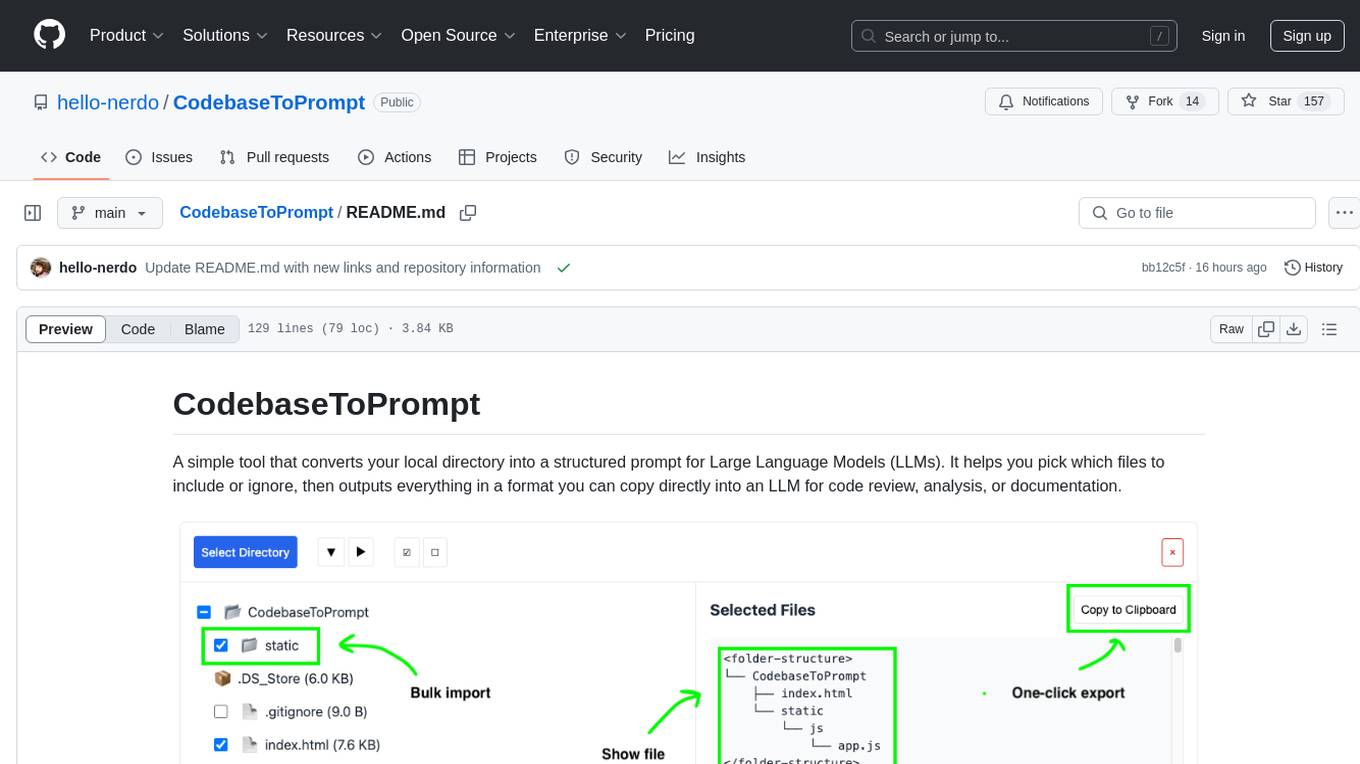
CodebaseToPrompt
CodebaseToPrompt is a tool that converts a local directory into a structured prompt for Large Language Models (LLMs). It allows users to select specific files for code review, analysis, or documentation by exploring and filtering through the file tree in an interactive interface. The tool generates a formatted output that can be directly used with LLMs, estimates token count, and supports flexible text selection. Users can deploy the tool using Docker for self-contained usage and can contribute to the project by opening issues or submitting pull requests.

CodebaseToPrompt
CodebaseToPrompt is a simple tool that converts a local directory into a structured prompt for Large Language Models (LLMs). It allows users to select specific files for code review, analysis, or documentation by exploring and filtering through the file tree in a browser-based interface. The tool generates a formatted output that can be directly used with AI tools, provides token count estimates, and supports local storage for saving selections. Users can easily copy the selected files in the desired format for further use.
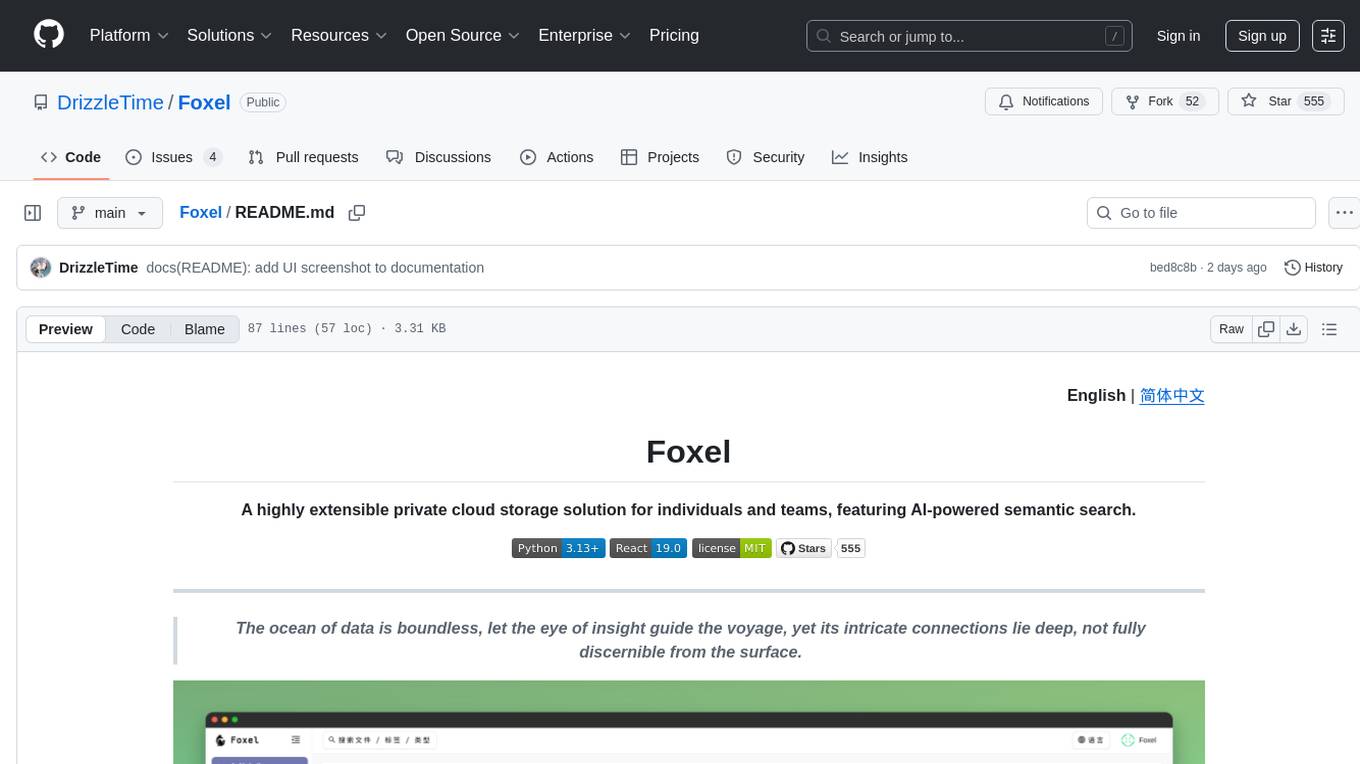
Foxel
Foxel is a highly extensible private cloud storage solution for individuals and teams, featuring AI-powered semantic search. It offers unified file management, pluggable storage backends, semantic search capabilities, built-in file preview, permissions and sharing options, and a task processing center. Users can easily manage files, search content within unstructured data, preview various file types, share files, and process tasks asynchronously. Foxel is designed to centralize file management and enhance search capabilities for users.
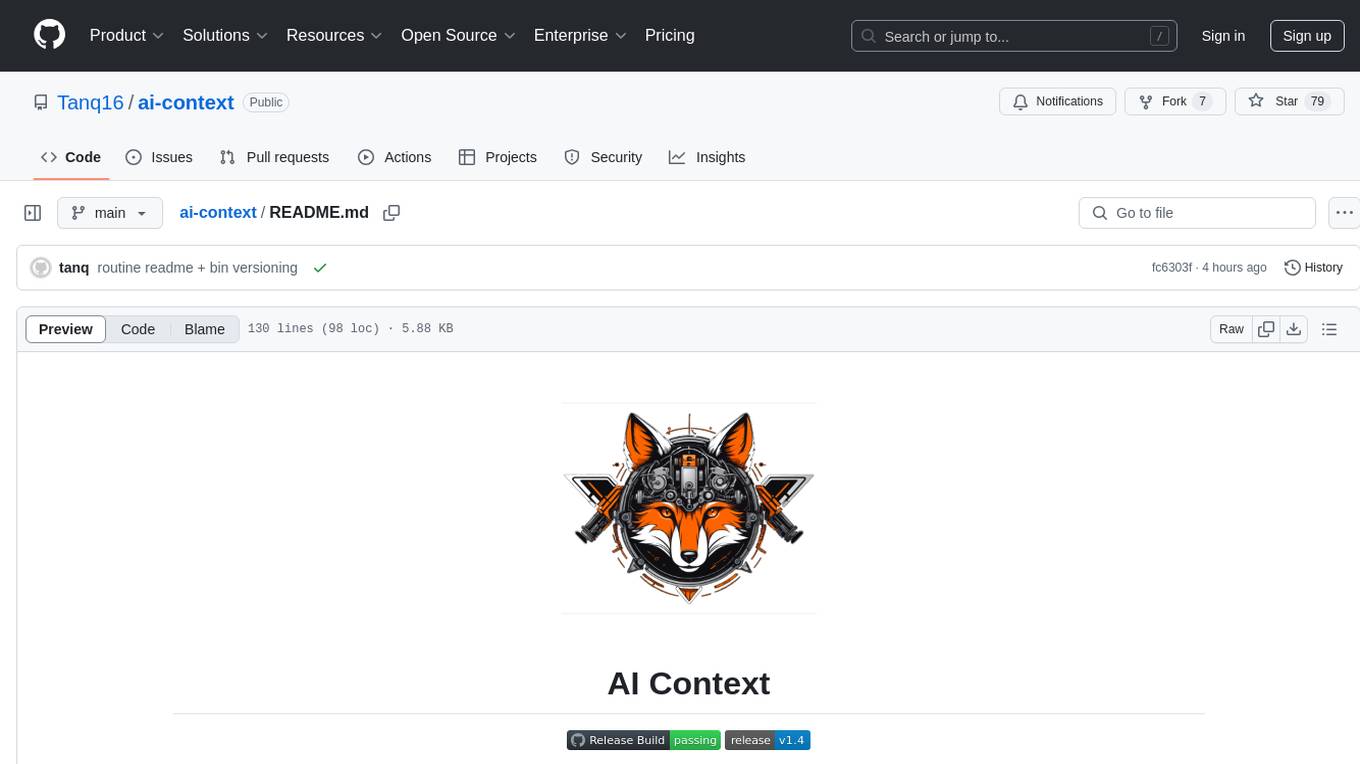
ai-context
AI Context is a CLI tool that generates AI-friendly markdown files from GitHub repos, local code, YouTube videos, or webpages. It supports processing local directories, GitHub repositories, YouTube transcripts, and webpages, converting them to markdown format. The tool simplifies interactions with LLMs like ChatGPT and Claude by providing a text-first context creation approach. It offers features for installation, usage, and acknowledgments, with options to process single paths, URLs, or lists of paths concurrently.
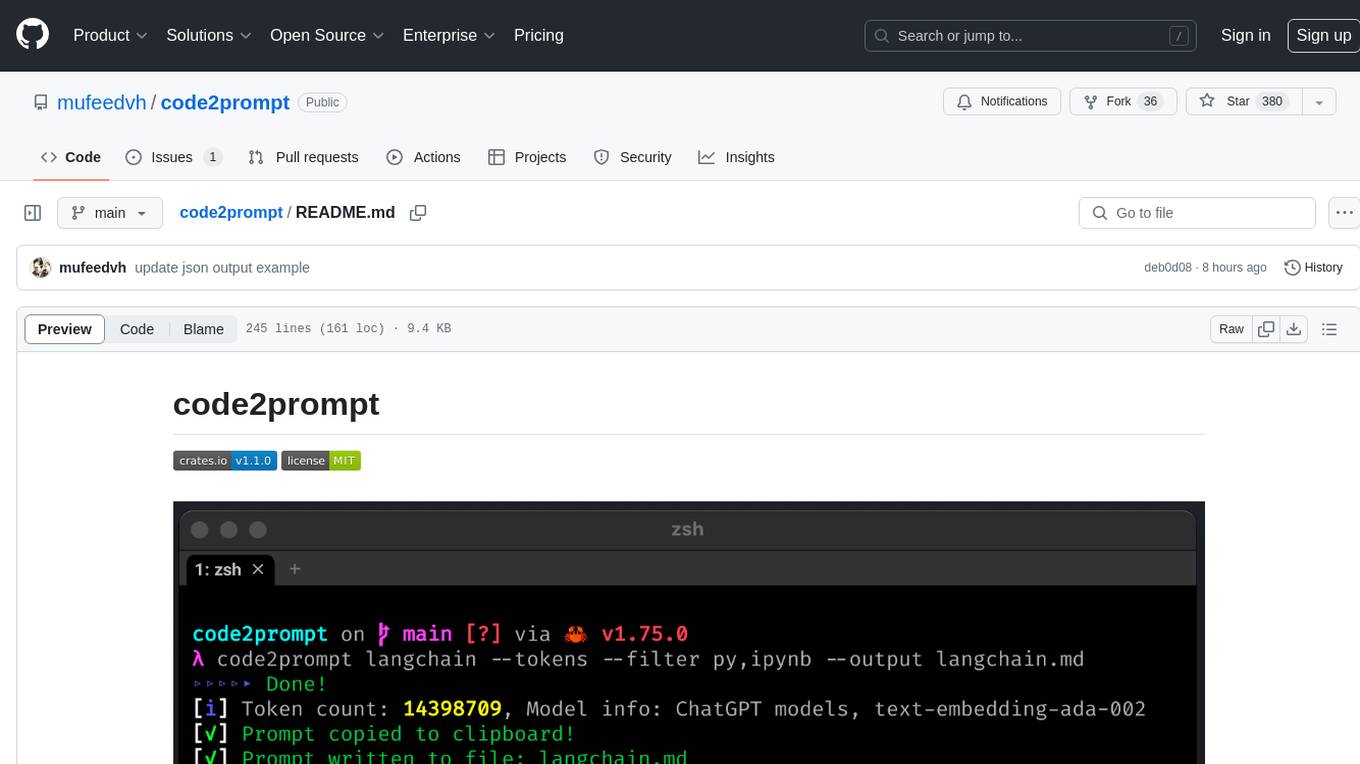
code2prompt
code2prompt is a command-line tool that converts your codebase into a single LLM prompt with a source tree, prompt templating, and token counting. It automates generating LLM prompts from codebases of any size, customizing prompt generation with Handlebars templates, respecting .gitignore, filtering and excluding files using glob patterns, displaying token count, including Git diff output, copying prompt to clipboard, saving prompt to an output file, excluding files and folders, adding line numbers to source code blocks, and more. It helps streamline the process of creating LLM prompts for code analysis, generation, and other tasks.

swark
Swark is a VS Code extension that automatically generates architecture diagrams from code using large language models (LLMs). It is directly integrated with GitHub Copilot, requires no authentication or API key, and supports all languages. Swark helps users learn new codebases, review AI-generated code, improve documentation, understand legacy code, spot design flaws, and gain test coverage insights. It saves output in a 'swark-output' folder with diagram and log files. Source code is only shared with GitHub Copilot for privacy. The extension settings allow customization for file reading, file extensions, exclusion patterns, and language model selection. Swark is open source under the GNU Affero General Public License v3.0.
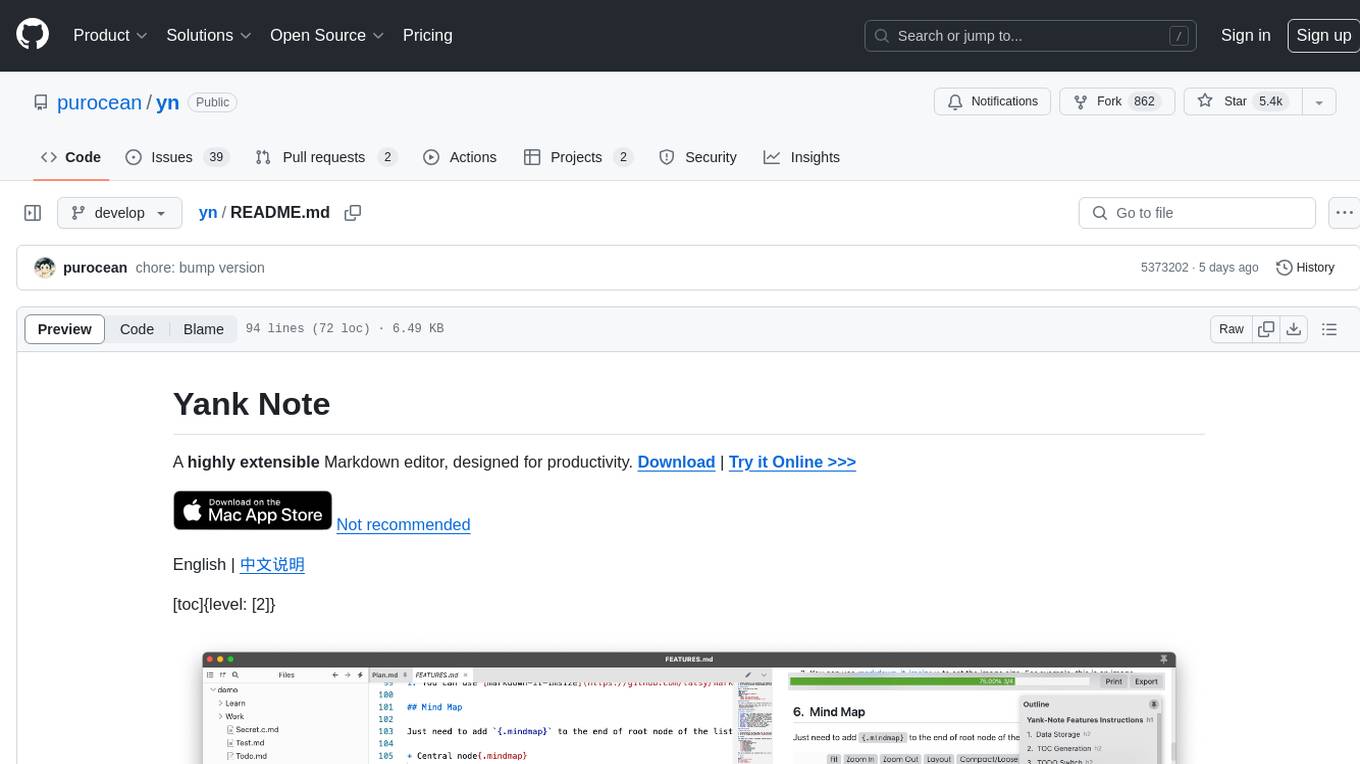
yn
Yank Note is a highly extensible Markdown editor designed for productivity. It offers features like easy-to-use interface, powerful support for version control and various embedded content, high compatibility with local Markdown files, plug-in extension support, and encryption for saving private files. Users can write their own plug-ins to expand the editor's functionality. However, for more extendability, security protection is sacrificed. The tool supports sync scrolling, outline navigation, version control, encryption, auto-save, editing assistance, image pasting, attachment embedding, code running, to-do list management, quick file opening, integrated terminal, Katex expression, GitHub-style Markdown, multiple data locations, external link conversion, HTML resolving, multiple formats export, TOC generation, table cell editing, title link copying, embedded applets, various graphics embedding, mind map display, custom container support, macro replacement, image hosting service, OpenAI auto completion, and custom plug-ins development.
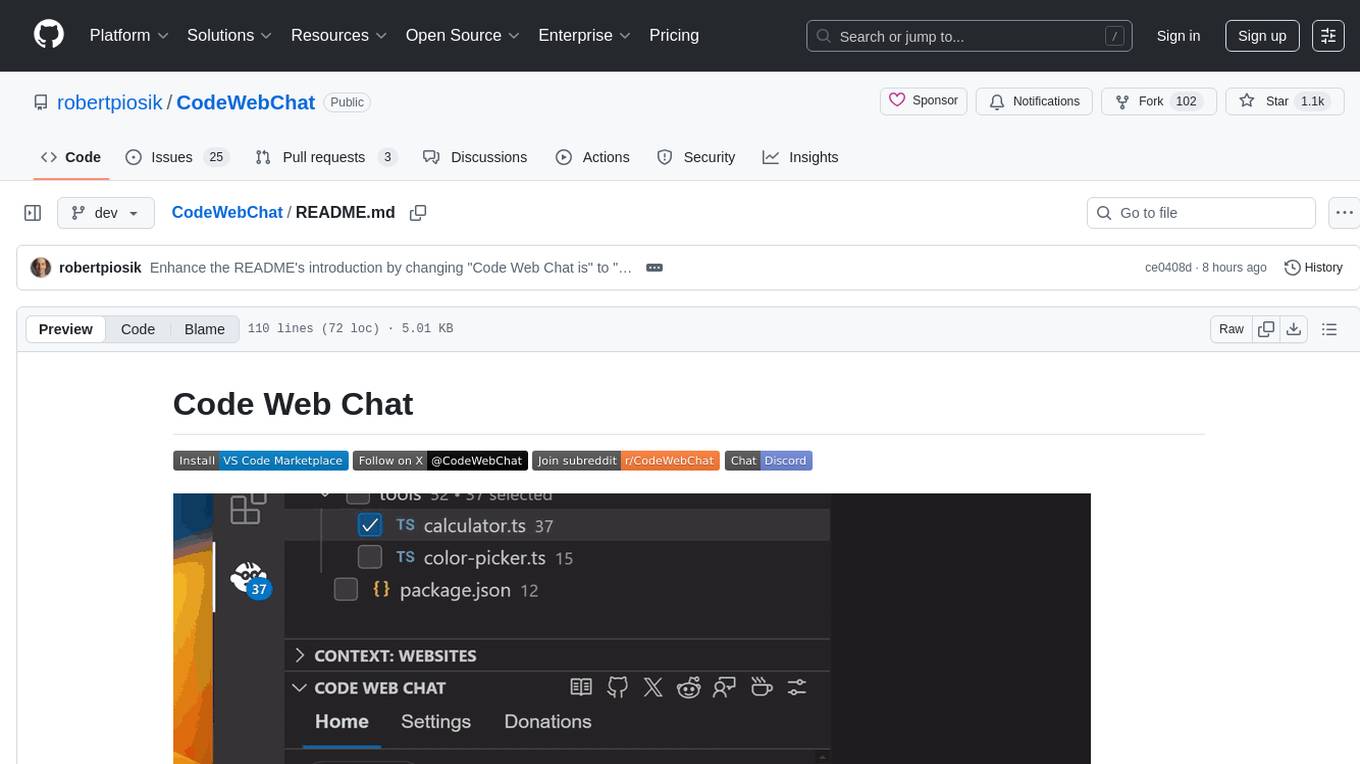
CodeWebChat
Code Web Chat is a versatile, free, and open-source AI pair programming tool with a unique web-based workflow. Users can select files, type instructions, and initialize various chatbots like ChatGPT, Gemini, Claude, and more hands-free. The tool helps users save money with free tiers and subscription-based billing and save time with multi-file edits from a single prompt. It supports chatbot initialization through the Connector browser extension and offers API tools for code completions, editing context, intelligent updates, and commit messages. Users can handle AI responses, code completions, and version control through various commands. The tool is privacy-focused, operates locally, and supports any OpenAI-API compatible provider for its utilities.
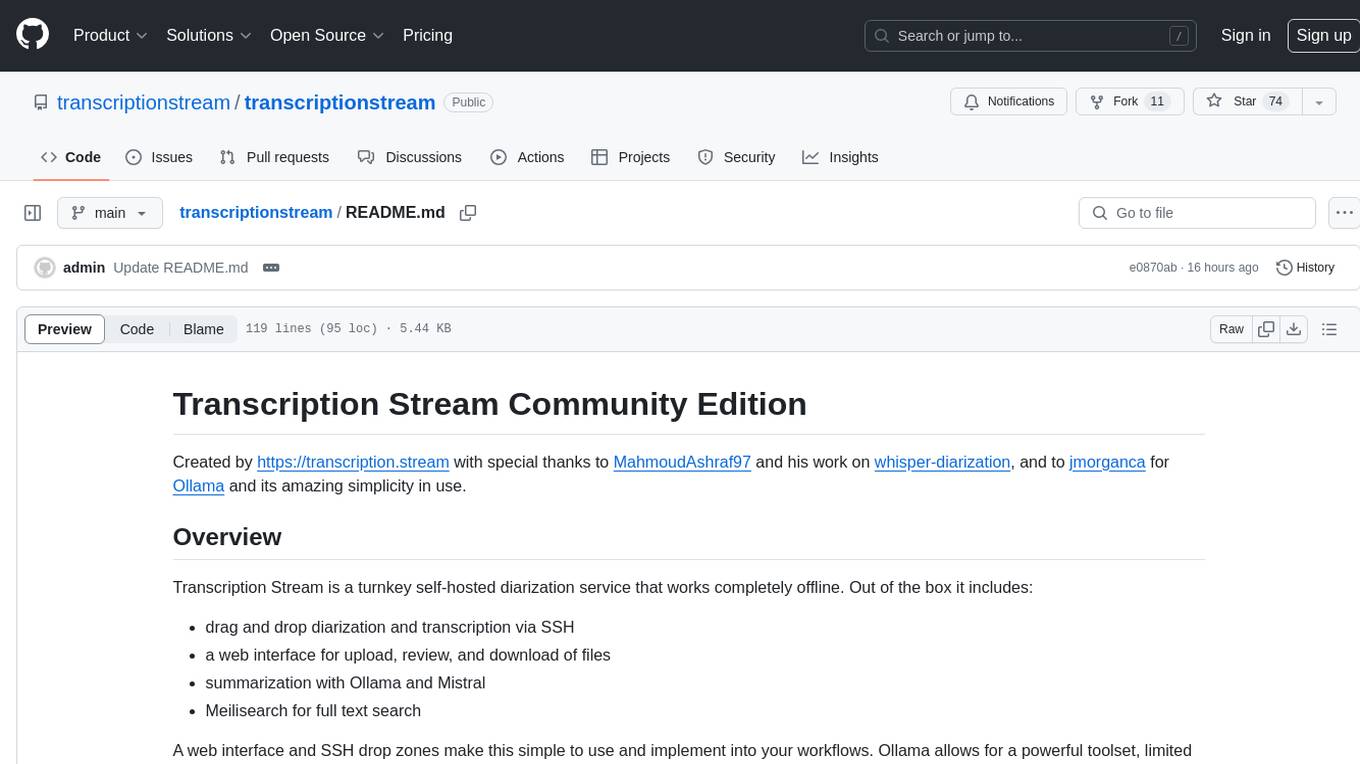
transcriptionstream
Transcription Stream is a self-hosted diarization service that works offline, allowing users to easily transcribe and summarize audio files. It includes a web interface for file management, Ollama for complex operations on transcriptions, and Meilisearch for fast full-text search. Users can upload files via SSH or web interface, with output stored in named folders. The tool requires a NVIDIA GPU and provides various scripts for installation and running. Ports for SSH, HTTP, Ollama, and Meilisearch are specified, along with access details for SSH server and web interface. Customization options and troubleshooting tips are provided in the documentation.
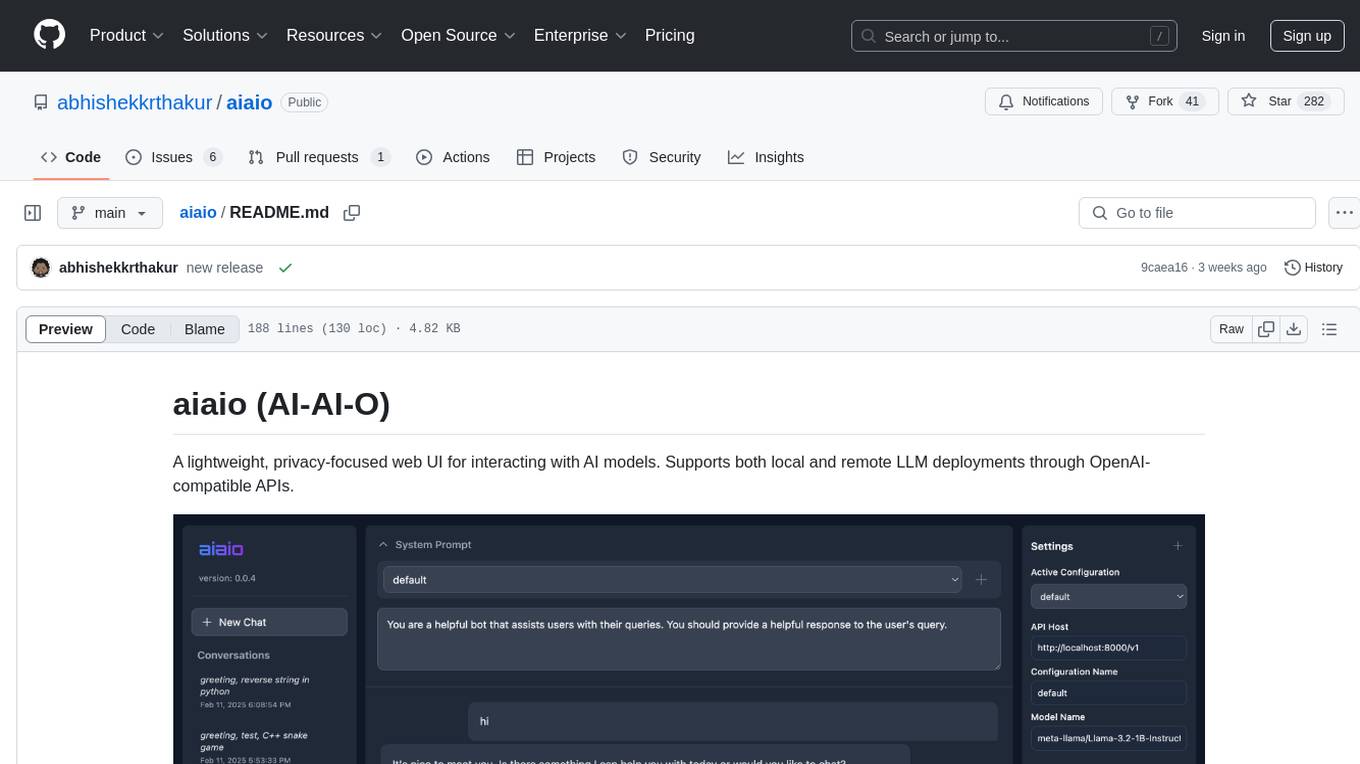
aiaio
aiaio (AI-AI-O) is a lightweight, privacy-focused web UI for interacting with AI models. It supports both local and remote LLM deployments through OpenAI-compatible APIs. The tool provides features such as dark/light mode support, local SQLite database for conversation storage, file upload and processing, configurable model parameters through UI, privacy-focused design, responsive design for mobile/desktop, syntax highlighting for code blocks, real-time conversation updates, automatic conversation summarization, customizable system prompts, WebSocket support for real-time updates, Docker support for deployment, multiple API endpoint support, and multiple system prompt support. Users can configure model parameters and API settings through the UI, handle file uploads, manage conversations, and use keyboard shortcuts for efficient interaction. The tool uses SQLite for storage with tables for conversations, messages, attachments, and settings. Contributions to the project are welcome under the Apache License 2.0.
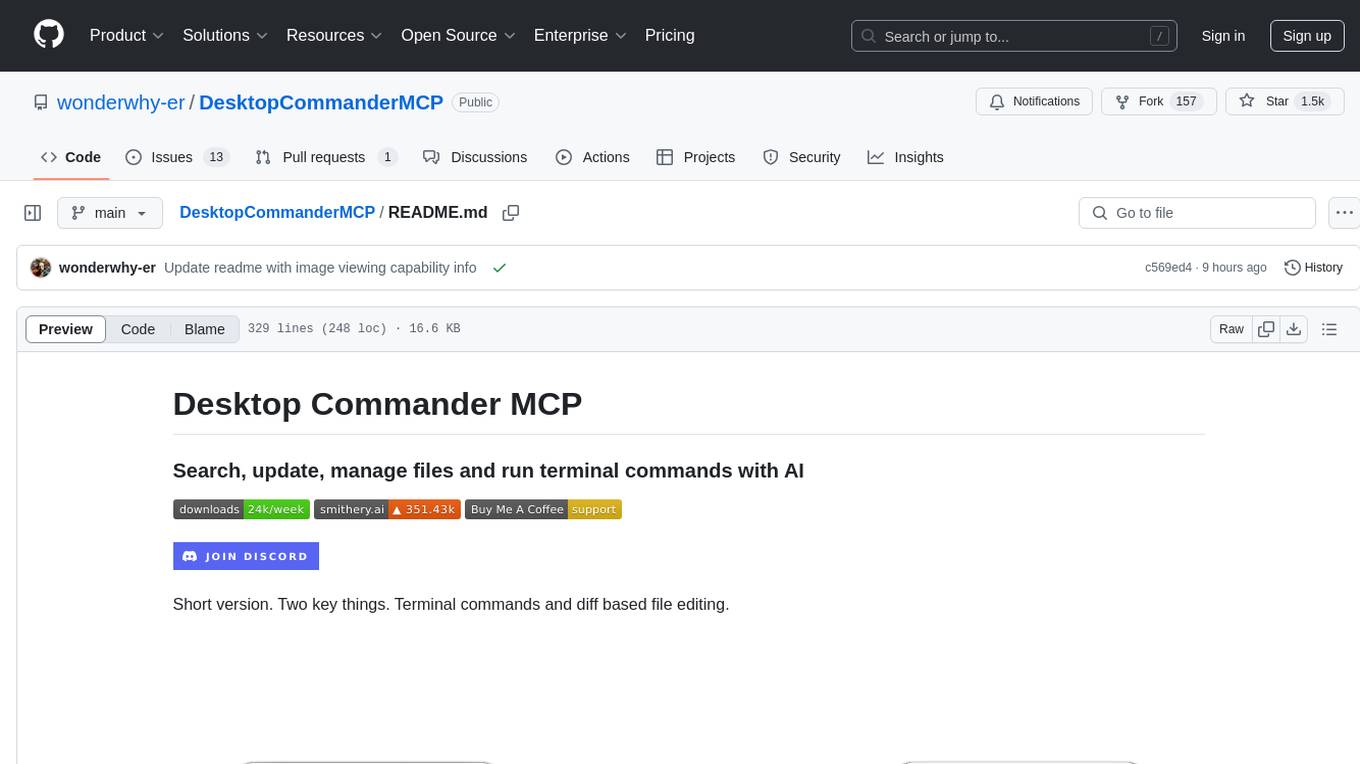
DesktopCommanderMCP
Desktop Commander MCP is a server that allows the Claude desktop app to execute long-running terminal commands on your computer and manage processes through Model Context Protocol (MCP). It is built on top of MCP Filesystem Server to provide additional search and replace file editing capabilities. The tool enables users to execute terminal commands with output streaming, manage processes, perform full filesystem operations, and edit code with surgical text replacements or full file rewrites. It also supports vscode-ripgrep based recursive code or text search in folders.
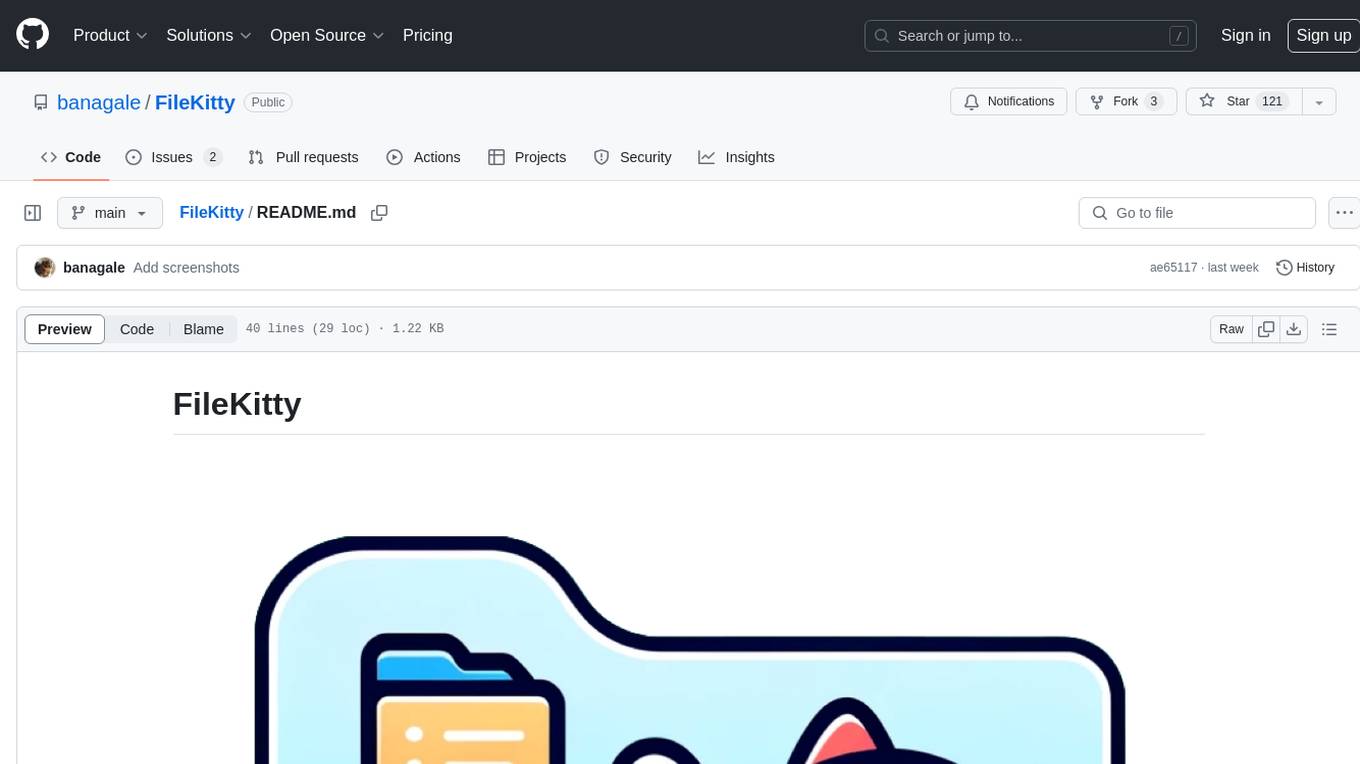
FileKitty
FileKitty is a simple file selection and concatenation tool that allows users to select files from a directory, concatenate them into a single file, save the concatenated file, and copy files to the clipboard. It is useful for concatenating files for use in a single file format and pasting file contents into an LLM to provide context to a prompt. The tool is built using Poetry to manage dependencies and build the app.
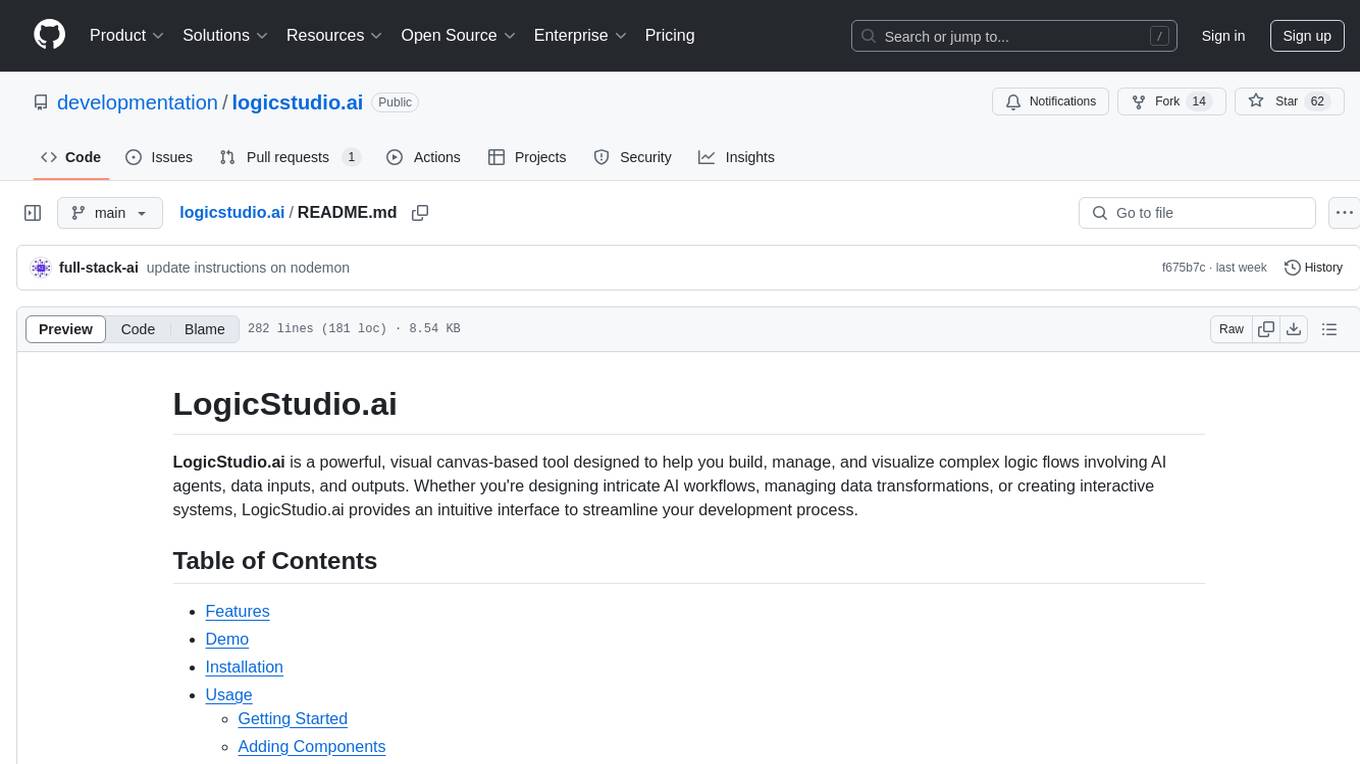
logicstudio.ai
LogicStudio.ai is a powerful visual canvas-based tool for building, managing, and visualizing complex logic flows involving AI agents, data inputs, and outputs. It provides an intuitive interface to streamline development processes by offering features like drag-and-drop canvas design, dynamic components, real-time connections, import/export capabilities, zoom & pan controls, file management, AI integration, editable views, and various output formats. Users can easily add, connect, configure, and manage components to create interactive systems and workflows.
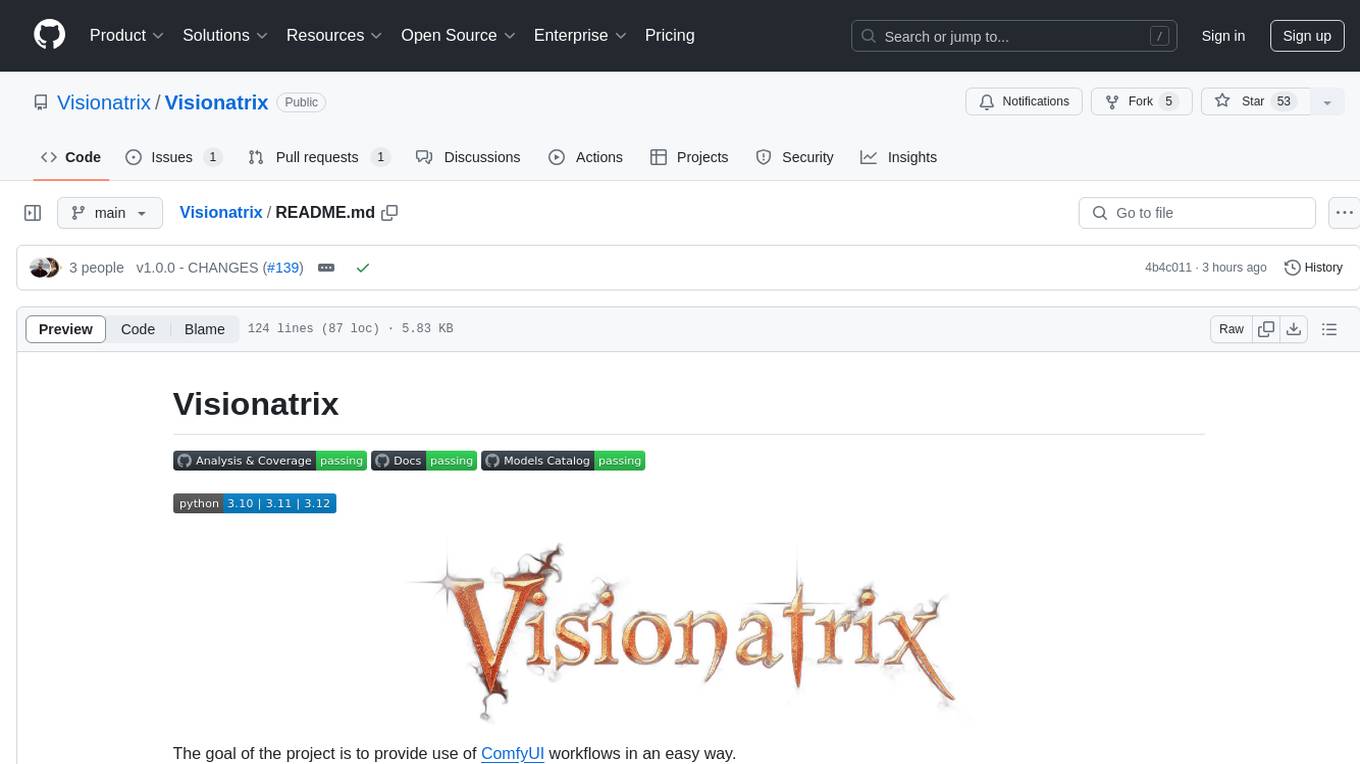
Visionatrix
Visionatrix is a project aimed at providing easy use of ComfyUI workflows. It offers simplified setup and update processes, a minimalistic UI for daily workflow use, stable workflows with versioning and update support, scalability for multiple instances and task workers, multiple user support with integration of different user backends, LLM power for integration with Ollama/Gemini, and seamless integration as a service with backend endpoints and webhook support. The project is approaching version 1.0 release and welcomes new ideas for further implementation.
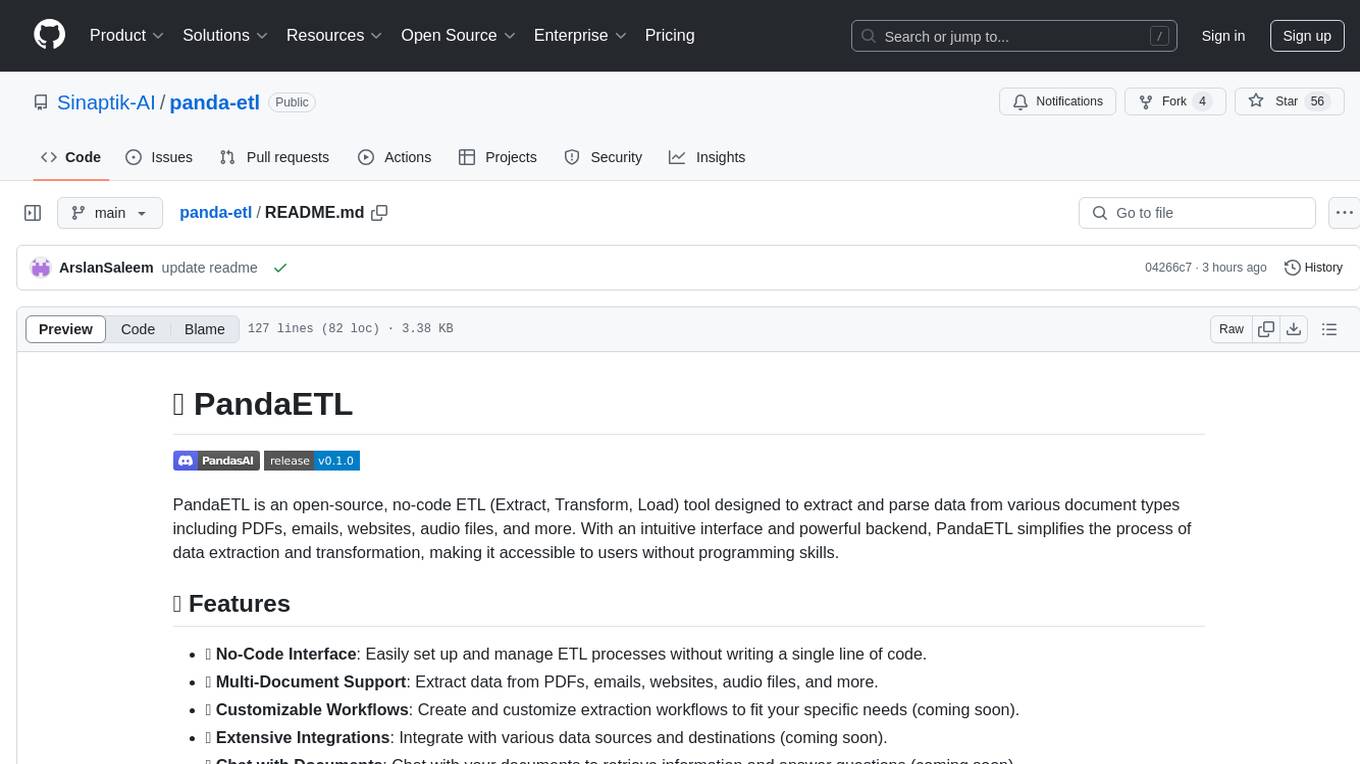
panda-etl
PandaETL is an open-source, no-code ETL tool designed to extract and parse data from various document types including PDFs, emails, websites, audio files, and more. With an intuitive interface and powerful backend, PandaETL simplifies the process of data extraction and transformation, making it accessible to users without programming skills.
For similar tasks

Local-File-Organizer
The Local File Organizer is an AI-powered tool designed to help users organize their digital files efficiently and securely on their local device. By leveraging advanced AI models for text and visual content analysis, the tool automatically scans and categorizes files, generates relevant descriptions and filenames, and organizes them into a new directory structure. All AI processing occurs locally using the Nexa SDK, ensuring privacy and security. With support for multiple file types and customizable prompts, this tool aims to simplify file management and bring order to users' digital lives.
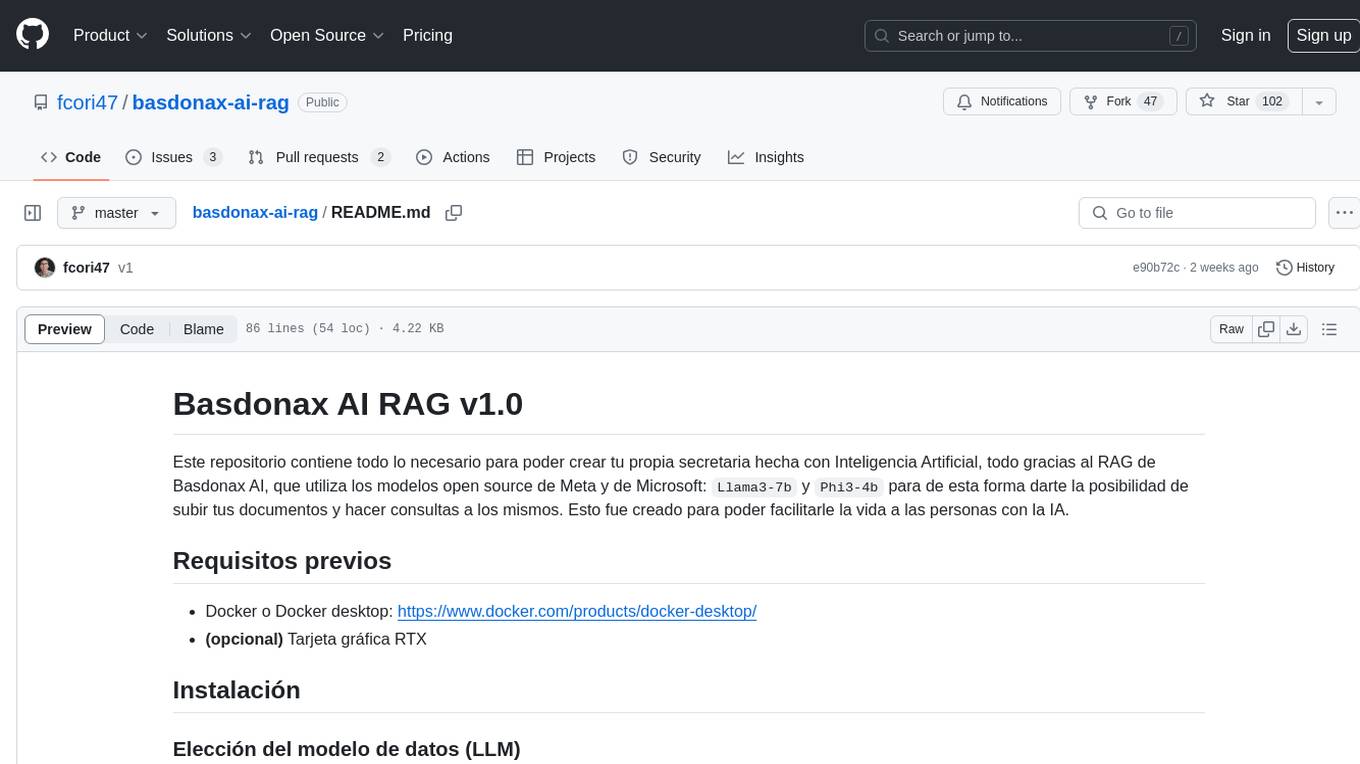
basdonax-ai-rag
Basdonax AI RAG v1.0 is a repository that contains all the necessary resources to create your own AI-powered secretary using the RAG from Basdonax AI. It leverages open-source models from Meta and Microsoft, namely 'Llama3-7b' and 'Phi3-4b', allowing users to upload documents and make queries. This tool aims to simplify life for individuals by harnessing the power of AI. The installation process involves choosing between different data models based on GPU capabilities, setting up Docker, pulling the desired model, and customizing the assistant prompt file. Once installed, users can access the RAG through a local link and enjoy its functionalities.
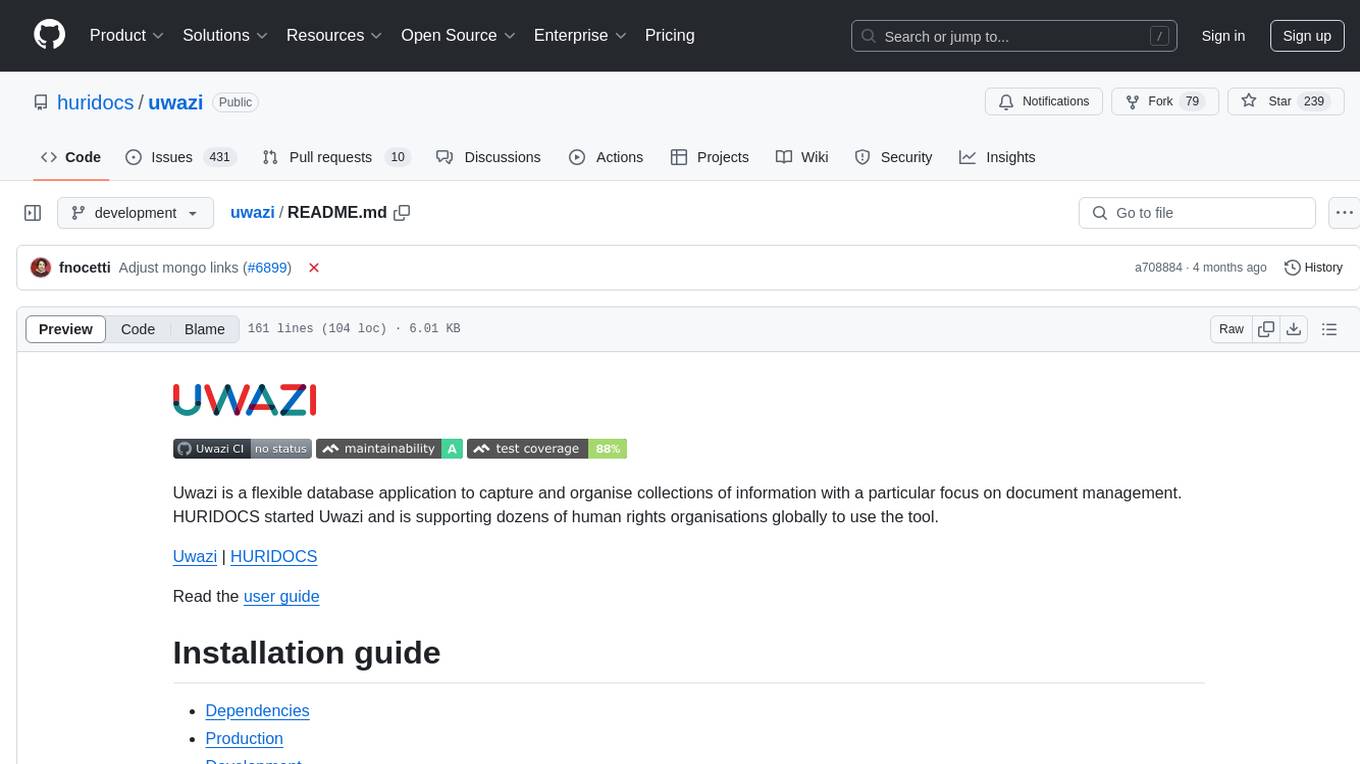
uwazi
Uwazi is a flexible database application designed for capturing and organizing collections of information, with a focus on document management. It is developed and supported by HURIDOCS, benefiting human rights organizations globally. The tool requires NodeJs, ElasticSearch, ICU Analysis Plugin, MongoDB, Yarn, and pdftotext for installation. It offers production and development installation guides, including Docker setup. Uwazi supports hot reloading, unit and integration testing with JEST, and end-to-end testing with Nightmare or Puppeteer. The system requirements include RAM, CPU, and disk space recommendations for on-premises and development usage.
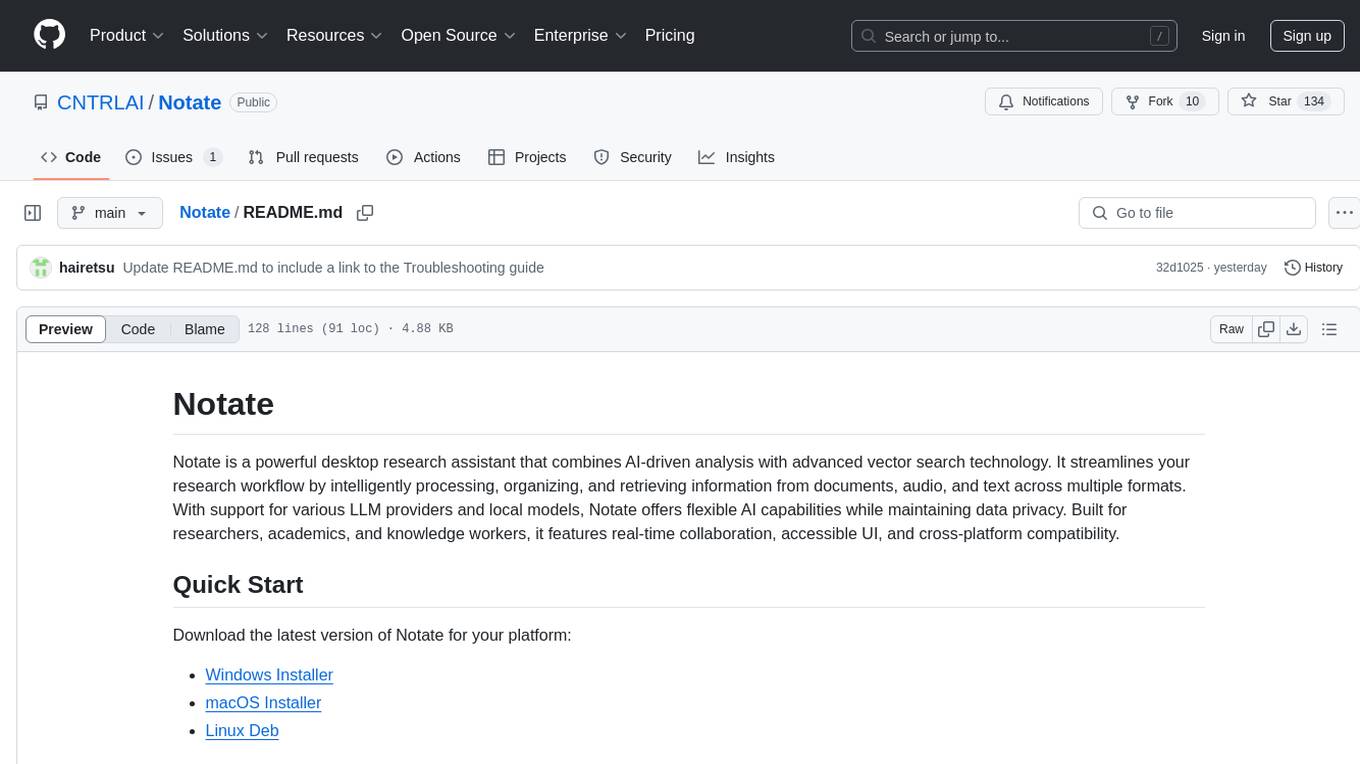
Notate
Notate is a powerful desktop research assistant that combines AI-driven analysis with advanced vector search technology. It streamlines research workflow by processing, organizing, and retrieving information from documents, audio, and text. Notate offers flexible AI capabilities with support for various LLM providers and local models, ensuring data privacy. Built for researchers, academics, and knowledge workers, it features real-time collaboration, accessible UI, and cross-platform compatibility.
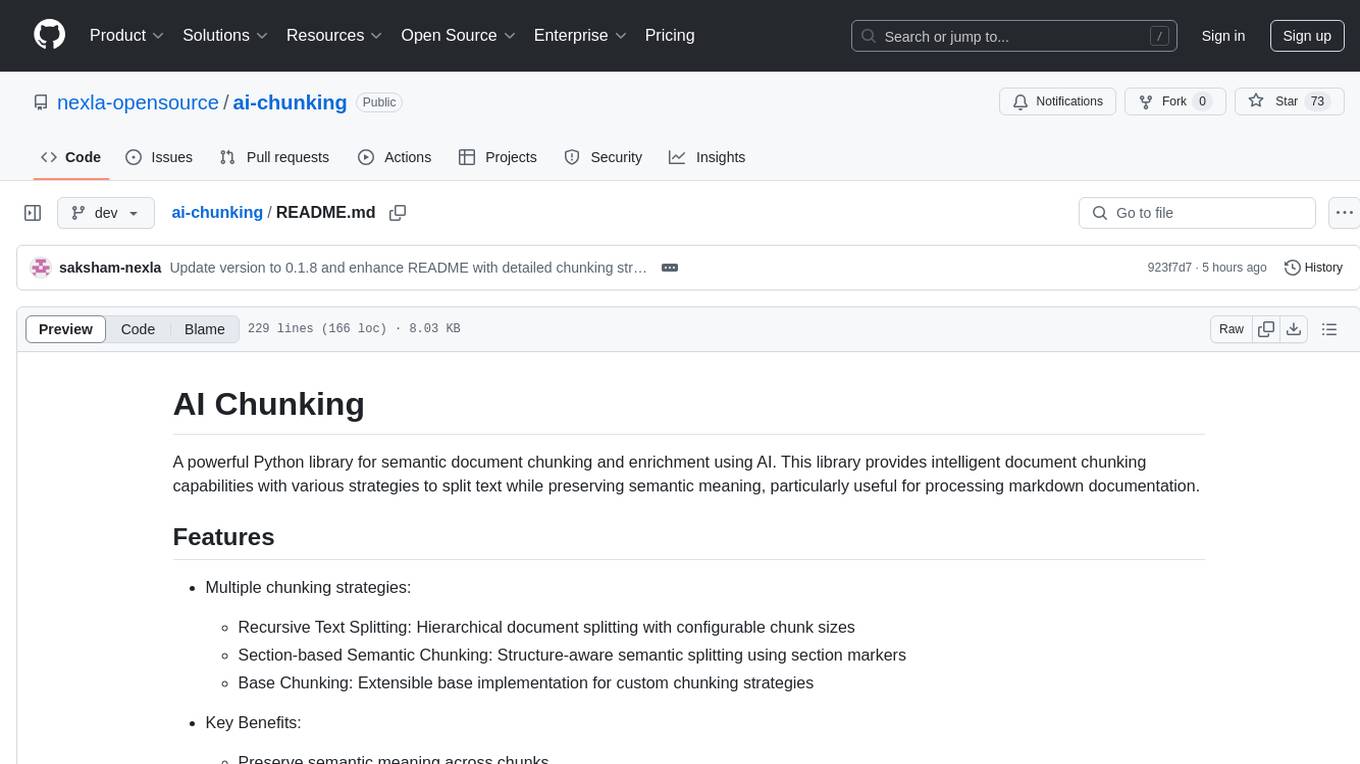
ai-chunking
AI Chunking is a powerful Python library for semantic document chunking and enrichment using AI. It provides intelligent document chunking capabilities with various strategies to split text while preserving semantic meaning, particularly useful for processing markdown documentation. The library offers multiple chunking strategies such as Recursive Text Splitting, Section-based Semantic Chunking, and Base Chunking. Users can configure chunk sizes, overlap, and support various text formats. The tool is easy to extend with custom chunking strategies, making it versatile for different document processing needs.
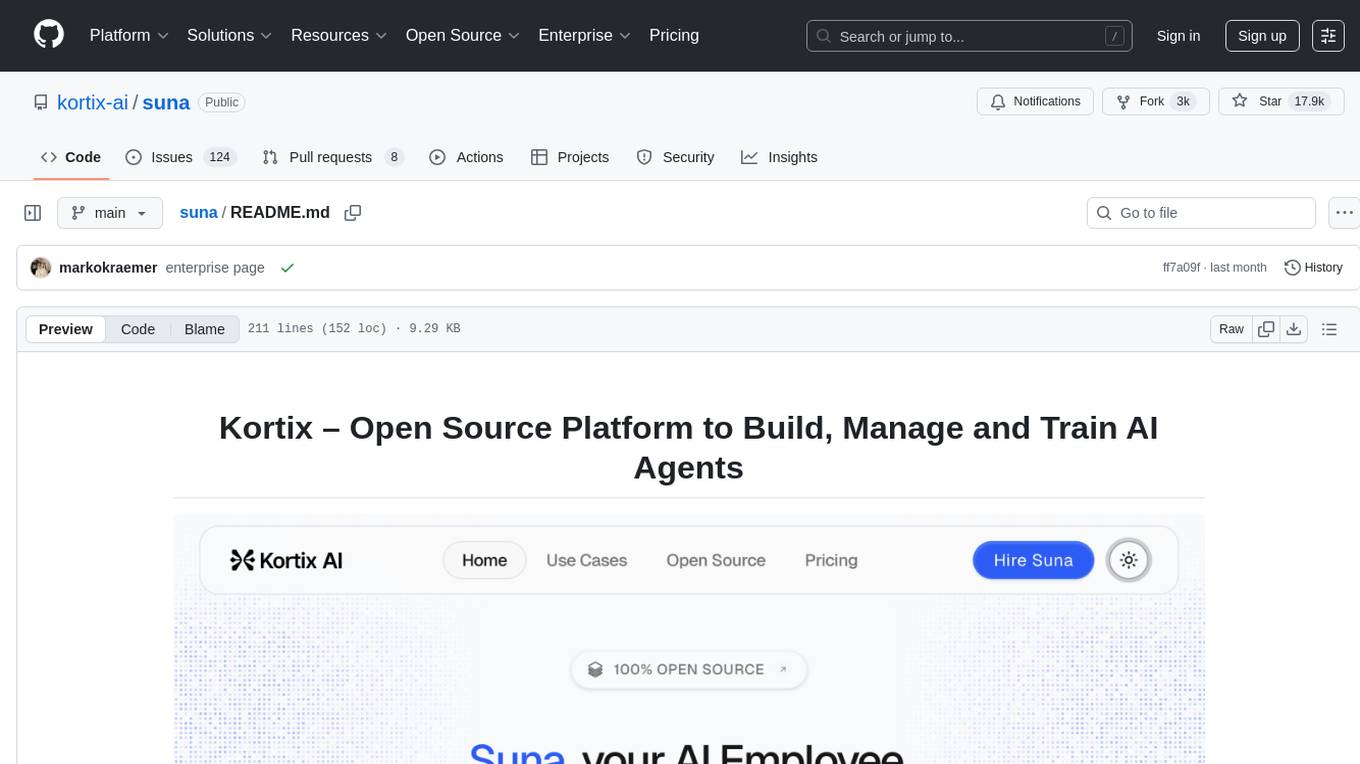
suna
Kortix is an open-source platform designed to build, manage, and train AI agents for various tasks. It allows users to create autonomous agents, from general-purpose assistants to specialized automation tools. The platform offers capabilities such as browser automation, file management, web intelligence, system operations, API integrations, and agent building tools. Users can create custom agents tailored to specific domains, workflows, or business needs, enabling tasks like research & analysis, browser automation, file & document management, data processing & analysis, and system administration.
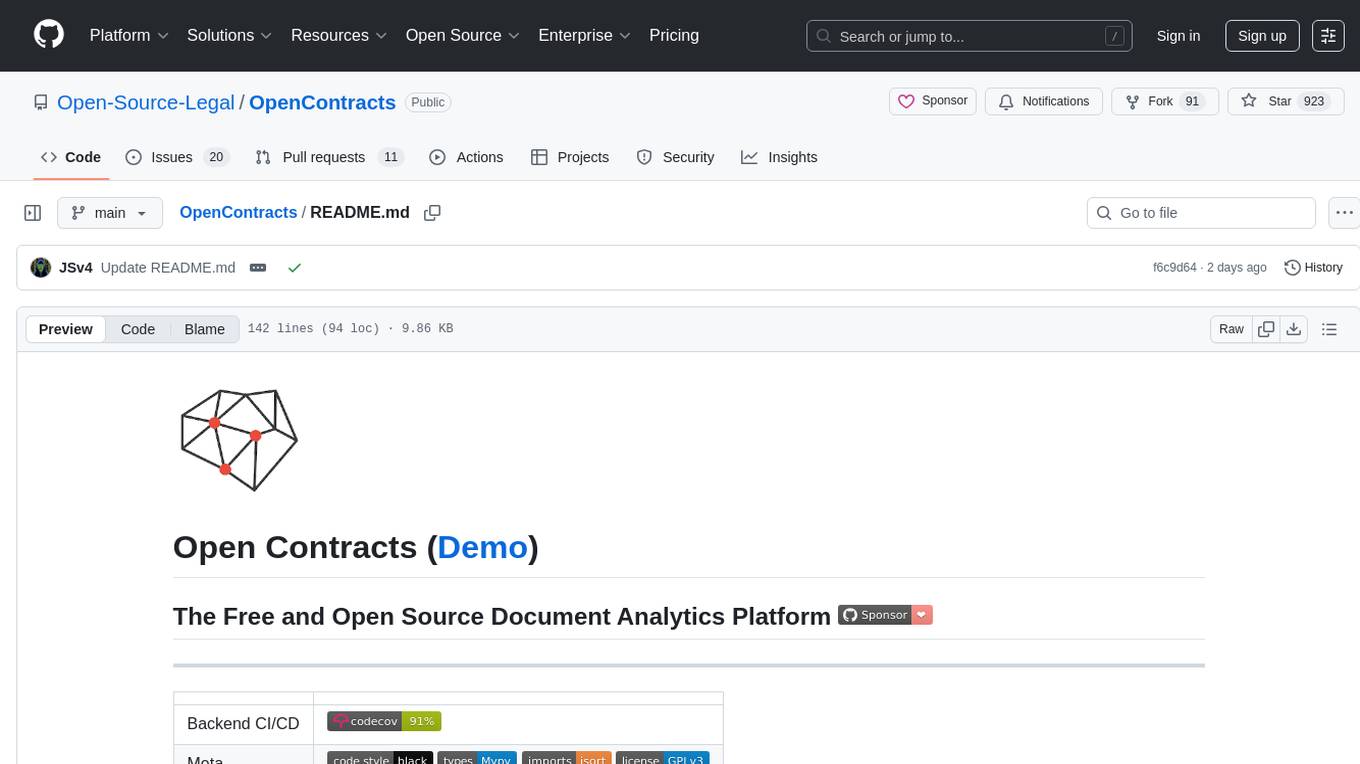
OpenContracts
OpenContracts is a free and open-source document analytics platform designed to empower knowledge owners and subject matter experts. It supports multiple document formats, ingestion pipelines, and custom document analytics tools. Users can manage documents, define metadata schemas, extract layout features, generate vector embeddings, deploy custom analyzers, support new document formats, annotate documents, extract bulk data, and create bespoke data extraction workflows. The tool aims to provide a standardized architecture for analyzing contracts and making data portable, with a focus on PDF and text-based formats. It includes features like document management, layout parsing, pluggable architectures, human annotation interface, and a custom LLM framework for conversation management and real-time streaming.

ai-guide
This guide is dedicated to Large Language Models (LLMs) that you can run on your home computer. It assumes your PC is a lower-end, non-gaming setup.
For similar jobs

LLMStack
LLMStack is a no-code platform for building generative AI agents, workflows, and chatbots. It allows users to connect their own data, internal tools, and GPT-powered models without any coding experience. LLMStack can be deployed to the cloud or on-premise and can be accessed via HTTP API or triggered from Slack or Discord.

daily-poetry-image
Daily Chinese ancient poetry and AI-generated images powered by Bing DALL-E-3. GitHub Action triggers the process automatically. Poetry is provided by Today's Poem API. The website is built with Astro.

exif-photo-blog
EXIF Photo Blog is a full-stack photo blog application built with Next.js, Vercel, and Postgres. It features built-in authentication, photo upload with EXIF extraction, photo organization by tag, infinite scroll, light/dark mode, automatic OG image generation, a CMD-K menu with photo search, experimental support for AI-generated descriptions, and support for Fujifilm simulations. The application is easy to deploy to Vercel with just a few clicks and can be customized with a variety of environment variables.

SillyTavern
SillyTavern is a user interface you can install on your computer (and Android phones) that allows you to interact with text generation AIs and chat/roleplay with characters you or the community create. SillyTavern is a fork of TavernAI 1.2.8 which is under more active development and has added many major features. At this point, they can be thought of as completely independent programs.

Twitter-Insight-LLM
This project enables you to fetch liked tweets from Twitter (using Selenium), save it to JSON and Excel files, and perform initial data analysis and image captions. This is part of the initial steps for a larger personal project involving Large Language Models (LLMs).

AISuperDomain
Aila Desktop Application is a powerful tool that integrates multiple leading AI models into a single desktop application. It allows users to interact with various AI models simultaneously, providing diverse responses and insights to their inquiries. With its user-friendly interface and customizable features, Aila empowers users to engage with AI seamlessly and efficiently. Whether you're a researcher, student, or professional, Aila can enhance your AI interactions and streamline your workflow.

ChatGPT-On-CS
This project is an intelligent dialogue customer service tool based on a large model, which supports access to platforms such as WeChat, Qianniu, Bilibili, Douyin Enterprise, Douyin, Doudian, Weibo chat, Xiaohongshu professional account operation, Xiaohongshu, Zhihu, etc. You can choose GPT3.5/GPT4.0/ Lazy Treasure Box (more platforms will be supported in the future), which can process text, voice and pictures, and access external resources such as operating systems and the Internet through plug-ins, and support enterprise AI applications customized based on their own knowledge base.

obs-localvocal
LocalVocal is a live-streaming AI assistant plugin for OBS that allows you to transcribe audio speech into text and perform various language processing functions on the text using AI / LLMs (Large Language Models). It's privacy-first, with all data staying on your machine, and requires no GPU, cloud costs, network, or downtime.